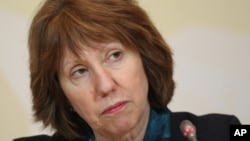PARIS —
European Union foreign ministers have agreed to ease an oil embargo against Syria to help rebel forces fighting the government of Syrian President Bashar el-Assad. The move follows a decision by the United States to dramatically increase aid to the Syrian opposition.
Speaking to reporters in Luxembourg, European Union foreign policy chief Catherine Ashton said the bloc's agreement to ease an oil embargo against Syria will help the opposition Syrian National Coalition take advantage of oil and gas reserves under its control.
"Three types of transactions will now be possible: imports of oil and petroleum products; exports of key equipment and technology for the oil and gas industry; and investments in the Syrian oil industry. We've made the energy our priority to ensure the changes have a rapid impact," said Ashton.
The decision by the EU foreign ministers comes a day after Secretary of State John Kerry announced the United States would double to $250 million its nonlethal assistance to Syria's opposition forces.
Speaking after Monday's meeting, British Foreign Secretary William Hague acknowledged that more needed to be done to help the Syrian opposition.
"It is a tragedy that we've not been able to agree a U.N. Security Council resolution to require a political process to take place," said Hague. "We will keep working on that. But in the absence of that, as we have been discussing here today and as I have been arguing, we will need to do more to support the National Coalition, to protect people in Syria, to save lives in Syria, to support the opposition."
Britain and France have also been pushing to lift an EU embargo against arming Syria's rebellion. The current embargo is set to expire at the end of May. But some EU countries like Germany are reluctant to arm the rebels, fearing the weapons could fall into the wrong hands. Those reservations were aired again Monday by German Foreign Minister Guido Westerwelle.
Westerwelle says Germany has serious concerns the arms could end up in the hands of terrorists. But he said if other European countries reach their own conclusions that go in a different direction, Germany will respect this.
Speaking to reporters in Luxembourg, European Union foreign policy chief Catherine Ashton said the bloc's agreement to ease an oil embargo against Syria will help the opposition Syrian National Coalition take advantage of oil and gas reserves under its control.
"Three types of transactions will now be possible: imports of oil and petroleum products; exports of key equipment and technology for the oil and gas industry; and investments in the Syrian oil industry. We've made the energy our priority to ensure the changes have a rapid impact," said Ashton.
The decision by the EU foreign ministers comes a day after Secretary of State John Kerry announced the United States would double to $250 million its nonlethal assistance to Syria's opposition forces.
Speaking after Monday's meeting, British Foreign Secretary William Hague acknowledged that more needed to be done to help the Syrian opposition.
"It is a tragedy that we've not been able to agree a U.N. Security Council resolution to require a political process to take place," said Hague. "We will keep working on that. But in the absence of that, as we have been discussing here today and as I have been arguing, we will need to do more to support the National Coalition, to protect people in Syria, to save lives in Syria, to support the opposition."
Britain and France have also been pushing to lift an EU embargo against arming Syria's rebellion. The current embargo is set to expire at the end of May. But some EU countries like Germany are reluctant to arm the rebels, fearing the weapons could fall into the wrong hands. Those reservations were aired again Monday by German Foreign Minister Guido Westerwelle.
Westerwelle says Germany has serious concerns the arms could end up in the hands of terrorists. But he said if other European countries reach their own conclusions that go in a different direction, Germany will respect this.




